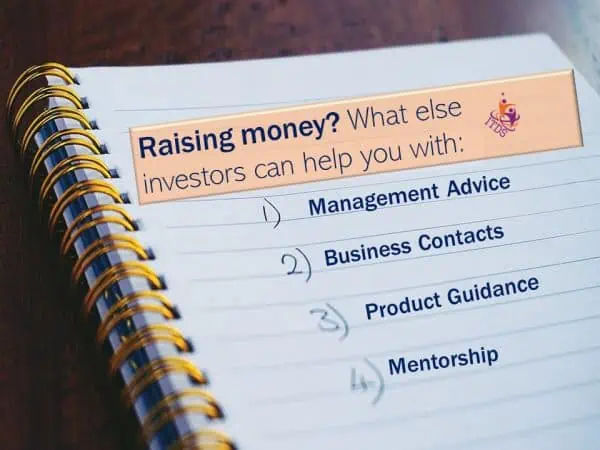Last Updated on March 5, 2024 by Lorna Barrow

“Raising money”…
You were enjoying the conversation until someone mentioned those words.
But why do you get that nauseous feeling in the pit of your stomach, that sense of dread, when you hear those words?
I think it’s because for the most part, you bring tremendous emotion to raising money for your business. Why?
You see, it’s the weakest area of your business performance and it really eats away at your confidence.
In this emotional state, you become suspicious of even simple facts that investors or lenders want to know.
So you convince yourself, you can outsource this activity and not be bothered with it.
But what if you could be proactive and place yourself in a position where you know the answers to at least some of these questions investors ask?
If you could, you would really unlock your financial success by having an easier time attracting funding. And it would also a tremendous boost for your “business confidence.”
So here’s how I will help you solve your problem.
I’ve chosen 10 questions which you should be able to answer BEFORE you even attempt to go after funding for your business.
When you are clear on the answer to these questions, you will confidently seek financing for your business, whenever it’s needed.
So, if you’re ready…Here’s the list in no particular order:
2. Can you define your purpose simply and concisely?
3. How much money are you looking to raise?
4. Who finances your type of business?
5. What is your purpose for raising money?
6. How risky is your business?
7. How fast do you want to pay back what you borrow?
8. Do you have any intellectual property or other unique traits?
9. Do you qualify for government grants or similar funding?
10. What can an investor help you with besides money?
1. What business are you in?
Yeah…What business are you in? I really mean that.
Asking yourself “what business am I in?” and really trying to answer that question is a good place to begin any in depth analysis of your business mission.
The reality is though, it’s not as straightforward as you think.
Here’s what I mean.
For me, my car represents reliable transportation. But for too many of my friends, theirs represent an ego trip.
Therefore, if you have a car dealership, are you in the business of providing reliable transportation for me?
Or…selling ego trips to my friends?
Understanding the nuances of this question will determine how you market your business to your customers and to your investors.
2. Can you define your purpose simply and concisely?
Clearly defining the purpose of a business often requires you to be simple and concise. But it seems that small businessowners hate simplicity.
Believe it or not, I have reached page 24 of a 60-page business proposal and still could not clearly understand what the business was about. (My bad?)
Try describing the purpose of your business in a single sentence (okay…I’ll accept two) using simple, jargon-free language.
For example, stating that your business is a:
“firm involved in the procurement and distribution of written materials across a wide geographic spectrum”
Will not impress me. Or any investor.
But telling me that you will be an “online book seller” will get my interest. And that of any investor.
Believe me, investors cannot invest in what they do not understand.
3. How much money are you looking to raise?

You would not believe the number of times I have had conversations like this:
“Lorna, I need some money to expand my business, you know where I can find some?”
How much money do you need?
Oh…I don’t know. I want to expand my existing product line and renovate the store…so I guess it’s how much I can get…
Now I ask you…
How in the name of finance can you raise money if you don’t know how much you want?
Knowing how much money you want should be the next step after you decide that you need money.
It also allows you to be constantly open to funding opportunities and to combine more than one source, if necessary.
So do the research.
Find out all the costs associated with what you want to do. Add a couple hundred dollars in case your calculations are a bit off, and you now know how much money you need.
4. Who finances your type of business?
Excuse me? Won’t a well-written business plan get me investment from any credible source?
No…Sorry.
Each type of investor has a certain portfolio they invest in.
They have business expertise in financing certain types of companies in specific industries, and they tend to stick with them.
For example, an investor may specialise in start-ups while a financial institution may limit their investments to low-risk companies.
When you have some idea who finances your type of business, you immediately place yourself ahead of the pack.
You can be more focused in who you approach and you will end up raising money in all the right places.
5. What is your purpose for raising money?
And don’t give me that smug answer “to grow my business!”
You see, the reason you are asking for money determines who you will ask.
If you are financing growth or expansion, you might look to stock offerings instead of a bank or an angel investor.
If your purpose is to purchase property or buildings, you might want to seek out certain government lenders who prefer this type of security.
What if you need money to buy capital equipment or other fixed assets, such as special machinery for production?
Then, you may want to explore leasing it from the manufacturer with a buy-out option.
But apart from the above reasons, being clear about why you’re doing anything, sets you up as a no-nonsense, successful leader.
6. How risky is your business?

What do you mean “not very”? in response to how risky is your business?
That never came up in any of the principles I learnt in any business school or on the business streets.
Mind you, I admit, it could’ve come up in class when I was sleeping.
That aside, if you want to attract financiers or backers, you’d better understand business risk and how to reduce it.
The higher the degree of risk, the higher the return on investment (ROI) investors will be expecting.
Therefore, you would have to match the amount of risk associated with your business to the right type of investor.
Oh! and when you write your proposal, you’d better not give the wrong impression about your risk.
Deliberately giving the wrong impression about your level of risk will undermine any trust in your business.
And this is the last thing you want.
7. How fast do you want to pay back what you borrow?
No, no, no…this is not entirely up to the lender.
This is something you need to know and here’s why.
Driven mostly by your notoriously poor cash flows, you borrow money, mostly on “favourable” low monthly payments.
What you overlook is that these low monthly payments spread the loan over a longer period, resulting in larger interest costs for you.
In addition, if you’d secured that loan by a bill of sale over the asset, or by some personal asset, they are not available for any other use, during the life of the loan.
But if you know how fast you want to payback, then you can use your negotiating skills to get terms that are very favourable to you.
8. Do you have any intellectual property or other unique traits?

Intellectual property or other unique traits are not things small businesspeople think about on an average day.
So how can I expect you to consider them when you’re raising money?
Well let me tell you why you should.
Investors are favourably impressed by companies who have intellectual property such as patents or proprietary technology.
They know, and you should know, that these make you very desirable as an investment prospect.
For example, perhaps you have developed a means to secretly warn facilitators, that a participant in one of our workshops is going to deliver a load, if we allow them to speak.
That would bring me and every other training facilitator to your doorstep ready to buy or invest.
So identify and claim any hidden talents you have. They just may increase your changes of attracting funding.
9. Do you qualify for government grants or similar funding?
Have you thoroughly explored the possibility of grants, subsidized or guaranteed loans?
The government and some private institutions have many programs to provide aid to certain sectors of the business community. This is especially true for the small business sector.
Here’s why that’s important if you’re raising money.
If you qualify for a grant and you’re willing to follow the somewhat onerous restrictions, that’s money you don’t have to repay.
Even if you don’t qualify for a grant, you might be in line for a low interest loan.
You can find out about these types of programs through the Small Business Associations, the government, trade associations and other businesspeople.
There are also associations who specialize in locating these types of loans and grants on your behalf.
Just remember that in most cases, a prerequisite for these special grants and government loans is a business plan.
Therefore, checkout this post on writing business plans, to get some help with preparing yours.
10. What can an investor help you with besides money?

In my experience there is one thing that really gets in the way of small businesspeople raising money.
You are usually very reluctant to give up even a tiny amount of equity in your business, in return for a very big slice of funding.
In addition, investors can sometimes serve as a business mentor and help with other areas of your business.
Some investors can offer management advice, product guidance, or business contacts.
They are often a great source of contacts with other businesses or people that you might benefit from knowing.
Therefore, insisting on wanting only money from investors can negatively impact your business flexibility.
First, you run the risk of not getting the funding at all. Then you also undermine the growth of your business by preventing it from getting vital help it may need to access.
Your next “money raising” steps…
So there you have them!
Some critical factors to consider when you want to attract investors to your business. But just remember two things:
1. Investors want to make money too. Sometimes entrepreneurs get so caught up in their own idea that they forget this fact.
2. You are not selling your product or service to your investors in the same way you sell to a customer. You’re selling a share in a money-making machine. So get the marketing right.
So grab your pen and paper and answer the 10 questions above. Yes…right now!
Why?
Even if you’re not thinking about raising money at the moment, whenever you are ready, you would have already done the heavy lifting.
How smart is that?



